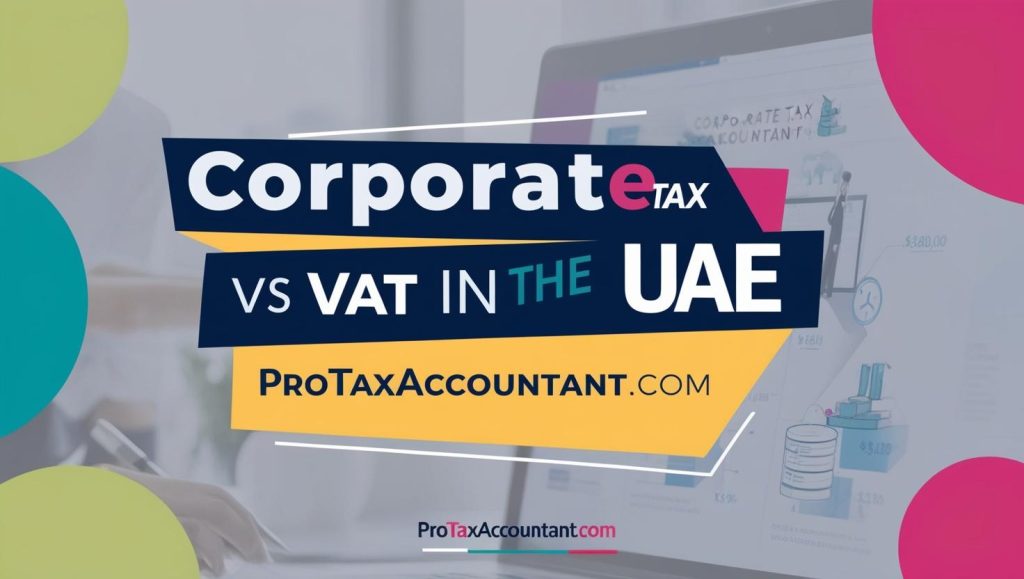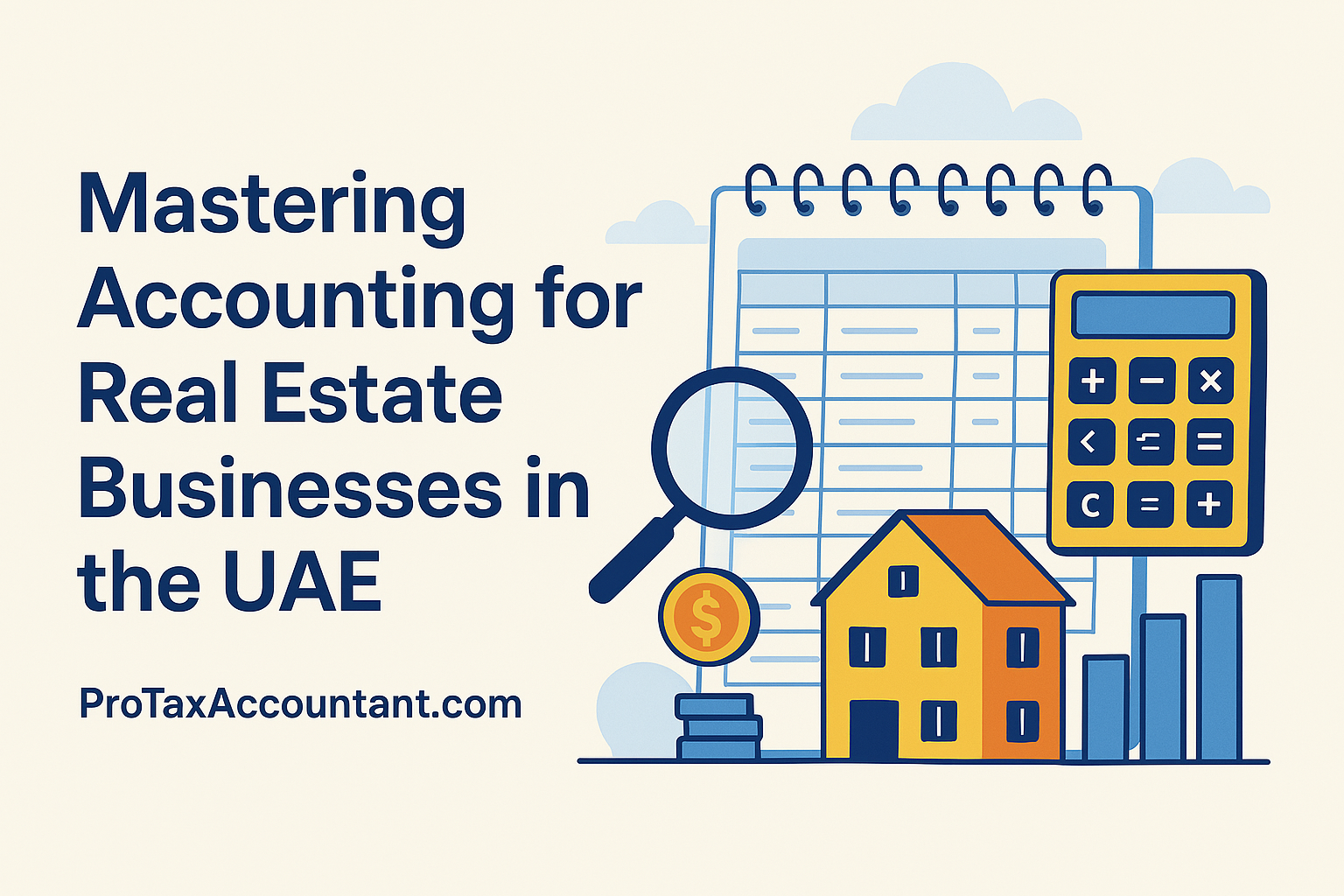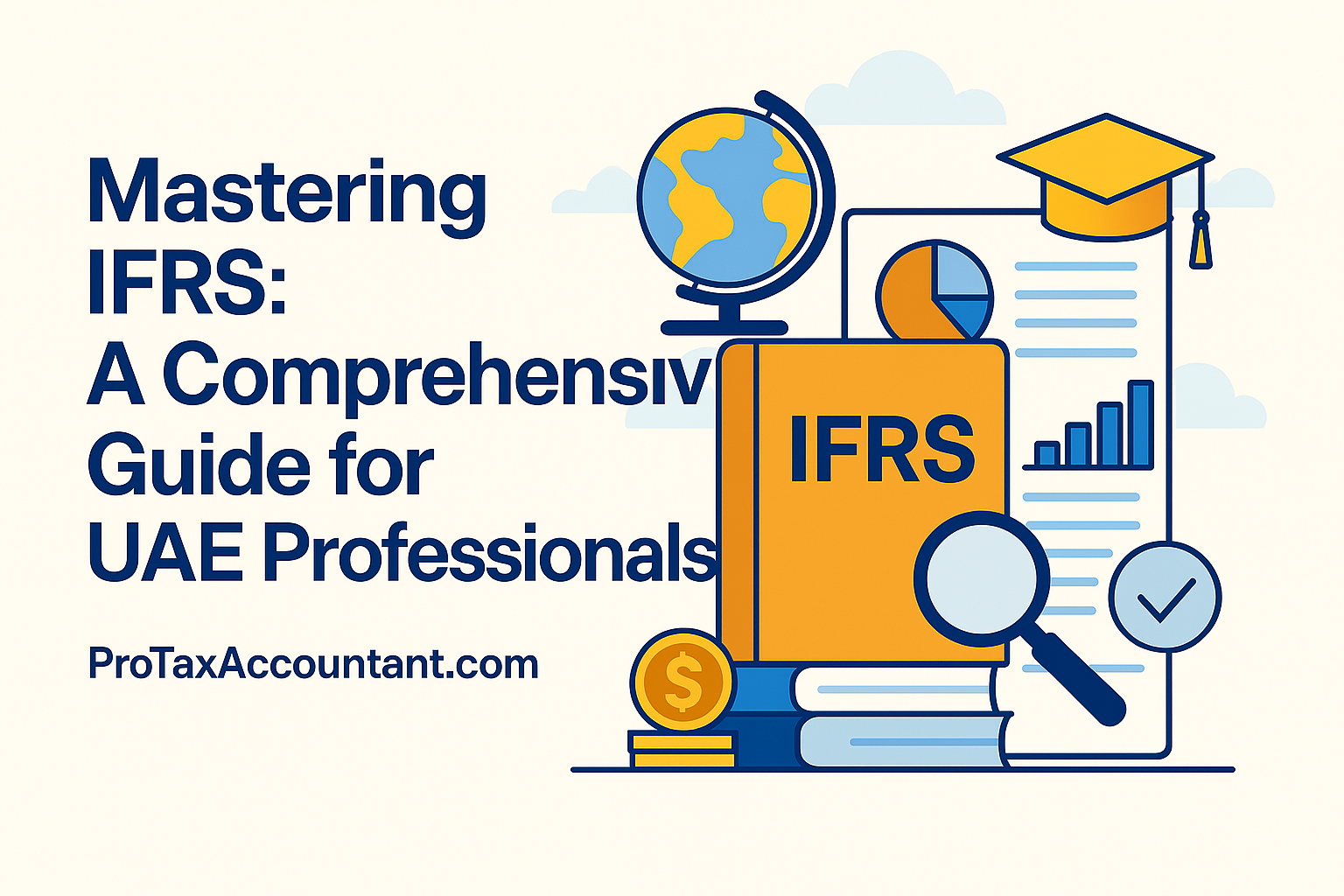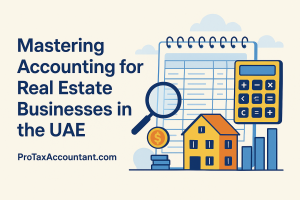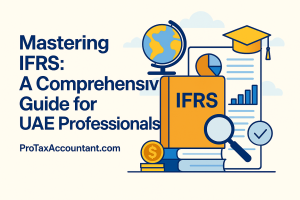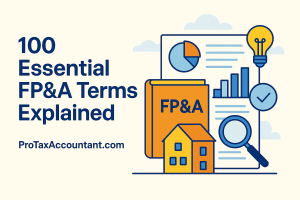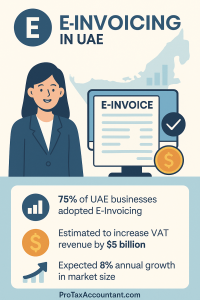When it comes to taxation in the UAE, two terms frequently make headlines:
Corporate Tax (CT) and Value-Added Tax (VAT).
While both are essential components of the country’s economic framework, they serve distinct purposes and affect businesses differently.
Understanding the difference between corporate tax and VAT is crucial for ensuring compliance, optimizing financial planning, and avoiding costly mistakes. In this guide, we’ll dive into the key distinctions, address common questions, and provide actionable insights to help you navigate these two tax regimes confidently.

What Is Corporate Tax?
Corporate Tax is a direct tax imposed on the net profit of businesses. Introduced in the UAE from June 2023, it is part of the government’s efforts to align with global tax standards while diversifying national revenue streams.
Key Features of Corporate Tax in the UAE:
- Tax Rate: 9% on taxable profits exceeding AED 375,000. Profits below this threshold are exempt.
- Applicability: Companies operating within the UAE, including branches of foreign businesses.
- Purpose: To tax business profits directly, ensuring fair contributions from corporations.
Pro Tip: Use our UAE Corporate Tax Calculator to estimate your liabilities.
What Is Value-Added Tax?
Value-Added Tax is an indirect tax applied to goods and services at each stage of the supply chain. Introduced in the UAE in 2018, VAT is aimed at generating revenue through consumption.
Key Features of VAT in the UAE:
- Tax Rate: 5% on most goods and services.
- Applicability: All businesses exceeding the mandatory VAT registration threshold (AED 375,000 annually).
- Purpose: To tax consumption and encourage economic sustainability.
Need help with VAT? Explore our VAT Registration Services.
Corporate Tax vs VAT:
| Aspect | Corporate Tax | VAT |
|---|---|---|
| Type of Tax | Direct tax on business profits. | Indirect tax on goods and services. |
| Tax Rate | 9% on profits above AED 375,000. | 5% on most goods and services. |
| Applicability | Businesses and branches in the UAE. | Businesses with annual turnover above AED 375,000. |
| Taxable Base | Net profit (income after expenses). | Sale price of goods and services. |
| Payment Responsibility | Paid directly by businesses. | Collected by businesses and paid by consumers. |
| Purpose | Revenue from corporate profits. | Revenue from consumption. |
| Filing Frequency | Annually. | Quarterly (in most cases). |
Key Differences Explained
1. Tax Base and Calculation
- Corporate Tax: Calculated on net profit, i.e., revenue minus allowable expenses. Businesses must maintain accurate financial records to determine taxable income.
- VAT: Applied as a percentage of the sale price of goods and services. VAT-registered businesses collect it from customers and remit it to the government.
2. Who Bears the Tax?
- Corporate Tax: Directly impacts businesses as they pay it from their profits.
- VAT: Passed on to consumers since it is added to the cost of goods and services.
3. Compliance Requirements
- Corporate Tax: Businesses must prepare audited financial statements and file annual tax returns.
- VAT: Requires businesses to maintain VAT invoices, file quarterly returns, and track input/output VAT for proper reconciliation.
4. Economic Impact
- Corporate Tax: Affects profit margins and may influence investment decisions.
- VAT: Impacts consumer spending patterns due to increased costs of goods and services.
FAQs About Corporate Tax and VAT in the UAE
Is Corporate Tax applicable to all businesses in the UAE?
No, businesses with profits below AED 375,000 are exempt. Additionally, certain sectors like natural resource extraction may follow separate tax rules.
Do small businesses need to register for VAT?
Yes, if their annual turnover exceeds AED 375,000. Voluntary registration is also available for businesses with turnover exceeding AED 187,500.
Can businesses claim deductions under Corporate Tax?
Yes, businesses can deduct eligible expenses, such as salaries, rent, and utility costs, to calculate taxable income.
Are VAT and Corporate Tax linked?
Not directly. VAT applies to consumption, while Corporate Tax targets profits. However, both require accurate record-keeping for compliance.
How are free zone companies taxed?
Free zone companies may qualify for a 0% corporate tax rate if they meet specific criteria, such as not conducting business in the mainland. VAT, however, applies to their taxable supplies.
Strategies for Managing Corporate Tax and VAT
-
Maintain Detailed Records
Accurate documentation is critical for both taxes. Use accounting software to track income, expenses, and VAT invoices.
-
Hire Tax Professionals
Navigating UAE tax laws can be complex. Professional tax consultants can help ensure compliance and optimize your tax obligations.
-
Stay Updated on Regulations
The UAE regularly updates its tax framework. Regularly review guidelines from the Federal Tax Authority (FTA).
-
Invest in Training
Educate your finance team on VAT filing procedures and corporate tax regulations to improve efficiency.
Why These Differences Matter
Understanding how corporate tax differs from VAT is essential for your business’s success in the UAE. Misinterpreting their purposes or compliance requirements can lead to fines or missed opportunities for tax optimization.
By proactively managing these taxes, you can:
- Boost profitability: Ensure accurate filings and avoid penalties.
- Enhance planning: Allocate resources efficiently for compliance.
- Stay competitive: Adapt to tax laws while maximizing savings.
Conclusion
Corporate tax and VAT serve different but equally important roles in the UAE’s taxation system. While corporate tax targets profits, VAT focuses on consumption, ensuring a balanced and sustainable revenue stream for the government.
By understanding these distinctions and adopting the right strategies, businesses can thrive in the UAE’s dynamic economic landscape.
Need expert assistance with tax compliance? Contact ProTaxAccountant.com today to simplify your tax journey!
Read more:

